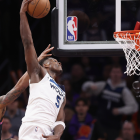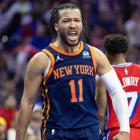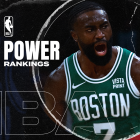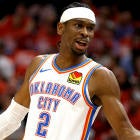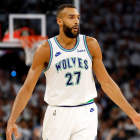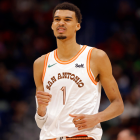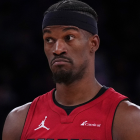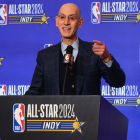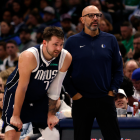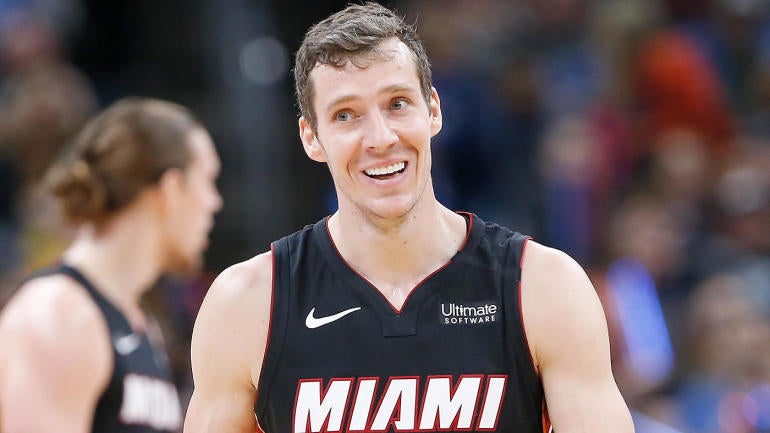
NBA trade-deadline buyers are not created equal. While every contender would like to improve before the (metaphorical) clock strikes 3 p.m. ET on Feb. 6, some teams are in a far stronger position to do so than others. As it stands right now, there are six teams with a meaningful chance to win the Eastern Conference. What would constitute a successful trade deadline varies wildly for each of them.
Some have far more to trade than others. Some have more financial flexibility in adding talent. Some have needs that better align with what is available on the market, or a front office better equipped to take advantage of that market, or even just a stronger motivation to make a move in the first place.
So when the dust settles, given the realistic constraints at play and the players we either know or assume to be available, we examine the best-case scenario for every contender in the Eastern Conference heading toward the looming trade deadline.
Milwaukee Bucks
Best-Case Scenario: An uneventful deadline for everybody else
Most of the Bucks' needs are theoretical. Take their purported late-game struggles, for instance. While their NBA-defined clutch offense is middle of the pack, their clutch defense has been so overwhelmingly dominant that Milwaukee still has the league's best clutch record (13-3) and second-best net rating (plus-25.5). Finding a real flaw here is practically impossible in objective terms. Playoff superstition is the guiding philosophy behind most of the more ambitious rumors that have surrounded them.
The Bucks could squash most of that noise by cashing in their remaining draft capital for a star guard like Chris Paul or Jrue Holiday, but there is no evidence to suggest that ownership is willing to do so. If Malcolm Brogdon isn't worth paying the luxury tax, who is? The Bucks have only around $3 million below the line to work with, so their functional financial flexibility is somewhat limited unless ownership changes its tune.
Given the gap between them and the rest of the Eastern Conference, that isn't a problem ... yet. For all of the crisis talk that followed their Christmas Day loss to the Philadelphia 76ers, the Bucks currently hold an eight-game lead for first in the East. The 5.4-point gap between them and the second-best net rated team in the Eastern Conference (the Boston Celtics) is bigger than the 5.2-point gap between those Celtics (ranked No. 4 overall) and the Oklahoma City Thunder (ranked No. 13). Right now, the Bucks are lapping the field.
So without a big move realistically in their sights, Milwaukee's ideal trade deadline is one that doesn't involve such a trade from any of its competitors. As it currently stands, the Bucks should be considered enormous favorites in the Eastern Conference. The only thing likely to change are injury or a blockbuster from someone else. Given the diminishing returns any trade would have for a 39-6 juggernaut, a quiet deadline is the biggest victory the Bucks could have in February.
Miami Heat
Best-Case Scenario: Find an upgrade over Goran Dragic
Unlike the Bucks, the Heat have both the ambition and the resources to swing a blockbuster. The only question is where. Miami's statistical weaknesses are minimal. While they aren't as overwhelmingly dominant as Milwaukee, the Heat are pretty good at just about everything. A dose of speed would be nice. While they have the NBA's third-most efficient transition offense (1.15 points per possession), they get the second-fewest transition opportunities in the league (13.9 per game). Someone who can score both individually and within the context of the offense would help as well. Miami scores nine fewer points per 100 possessions when Jimmy Butler sits, so another offensive generator would be appreciated.
Kevin Love would bring both. His outlet passing would work wonders on such an athletic roster, and while he is hardly the post-up scorer he once was, he can still do so well enough to unlock offense for the rest of the bench. He would slide neatly into Meyers Leonard's current role, but his contract presents a problem for Miami's long-term aspirations. Despite adding Butler without cap space last summer, the Heat have shown no appetite for trying to repeat the trick in 2021, when Giannis Antetokounmpo hits the market. Love would be on the books for $31.3 million that summer. The Heat ignored Paul for the same reason.
But Paul is an interesting template. Point guard is the next logical place to look beyond power forward. The backup spot, and primary engine of bench offense, is currently Dragic, and while his individual numbers are quite good, Miami's offense struggles mightily when he replaces Butler. His expiring $19.2 million salary makes him incredibly tradable, though, and that is part of what plasters Miami all over every trade rumor.
Holiday and Kyle Lowry are the obvious names, but another candidate worth at least asking for would be Spencer Dinwiddie. Eventually, Brooklyn is going to have to reckon with the fact that it has two high-usage ball-handlers in Dinwiddie and Caris LeVert who struggle to shoot on a team that will eventually be built around Kyrie Irving and Kevin Durant. Dinwiddie's value will never be higher than it is now, after his All-Star-worthy stretch, so cashing in makes sense. Brooklyn could really use Justise Winslow's defense. Dinwiddie's light cap hold makes him more retainable in 2021, and his willingness to come off the bench helps the effort not to displace Kendrick Nunn. Miami would do so for the right player, and that is what they'll seek this deadline. They are a Dragic upgrade away from true contention.
Boston Celtics
Best-Case Scenario: Consolidate their center minutes with a rim-protector
The advantage of this offseason's exodus for Boston was that it managed to clarify a lot of things for its roster. The Celtics have five core players using the bulk of their perimeter minutes and possessions in Kemba Walker, Jaylen Brown, Jayson Tatum, Gordon Hayward and Marcus Smart. There are no thorny questions about minutes or shots. The balance works out nicely. If only the same could be said of Boston's centers.
Daniel Theis and Enes Kanter each play around 15-20 minutes, with Robert Williams rotating in depending on matchups or injuries. Theis fares well as a team defender, but he's a limited rim-protector at 6-foot-8 and isn't athletic enough to be a great pick-and-roll finisher. Kanter isn't either, and earns minutes through scoring and rebounding that are more luxury than necessity. Ideally, the Celtics would find a center who could give them roughly 30 minutes of high-level defense, rebounding and finishing, with Theis garnering the rest of the playing time as the backup.
The Celtics have the assets to acquire such a player, but matching salary poses a real challenge. Kanter and rarely-used prospect Vincent Poirer get them to around $7.2 million, but beyond those two, things get difficult. Would the Celtics give up on Romeo Langford after half of a season? The last two lottery guards they dumped so quickly turned out to be Chauncey Billups and Joe Johnson, so there might be organizational pause. That trio could net someone like Cody Zeller or DeWayne Dedmon, but such upgrades would be fairly minimal.
Boston's true path to a difference-maker would come through multiple deals. Zeller might not be a big enough upgrade, but Tristan Thompson would. The Celtics don't have the salary to get him now, but they have a path to finding it. The Traded Player Exception works by ensuring that the incoming and outgoing salaries involved in a deal fall within a certain percentage of each other. However, no rule prevents teams from making trades specifically for the purpose of acquiring higher-salaried players that they could then trade again.
Boston could theoretically exploit this flawed system to trade for someone in Zeller's price range, and then flip that player along with a pick or two for Thompson. The only downside is that such players cannot be aggregated with the salaries of other players in trades, but if Danny Ainge were to sequence the deals properly, doing so wouldn't be necessary.
Toronto Raptors
Best-Case Scenario: Sell high on Norman Powell
The Raptors are stuck in no man's land from a trading perspective. They are too good to sell off core pieces or championship heroes, but aren't one trade away from a championship either. Unlike some of the other teams in the East, they should be looking at smaller moves with an eye on their future.
If anyone in their rotation is tradable right now, it would be Norman Powell. He is playing well above his head, averaging almost 16 points per game after spending the last two years struggling to hold onto his spot in the rotation at times. Toronto would also probably rather have his $11.3 million player option off the books for their inevitable 2021 Giannis pursuit considering the hefty extensions they will be paying Pascal Siakam and Fred VanVleet by then. If some team wants to give them a draft pick or two at the peak of Powell's value, why not let them?
Toronto has more than enough cheap wing depth in OG Anunoby, Rondae Hollis-Jefferson and Terence Davis to give up Powell, especially considering how often it uses two point guards. His shooting would be missed, but Toronto's player development track record will be attractive on the buyout market. The Raptors will more than likely stay put, but if they do decide to make a trade, Powell seems like the likeliest player to go.
Indiana Pacers
Best-Case Scenario: Flip Aaron Holiday for Robert Covington
The Pacers made a very conscious decision in how they allocated their resources this summer: offense was the priority. It made sense given the ending to their 2018-19 season. The Pacers had the NBA's 23rd-ranked offense once Victor Oladipo went down, and followed that up by scoring only 367 total points in four playoff games. So two good defensive wings in Thaddeus Young and Bojan Bogdanovic left to make way for two bad ones: T.J. Warren and Jeremy Lamb. That hasn't exactly led to bad defense. The Pacers are stout enough elsewhere to be ranked No. 10 on that end of the floor. It just poses a matchup problem against certain teams. The Pacers have good defensive guards and a great defensive center, but little in between.
Robert Covington would go a long way in fixing that. While not a man-to-man stopper, he is an elite team defender who is currently eighth in the NBA in deflections per game (3.5). He is a menace in passing lanes who is great at funneling ball-handlers into rim-protectors, and his 6.4 3-point attempts per game might at least help drag the Pacers out of the basement in terms of long-range attempts.
The Minnesota Timberwolves shouldn't trade Covington. The rumors surrounding him all season are nonsensical. Two-way wings of his caliber don't exactly grow on trees, and the Wolves are barely a league-average defense as it is. A mediocre first-round pick does far less for them than a seasoned 3-and-D wing. But a starting-caliber point guard? That might change the equation a bit. The Ringer's Kevin O'Connor reported that Minnesota asked the Pacers about backup Aaron Holiday after trading away Jeff Teague. The Pacers said no, but it is unclear if Covington came up in those conversations.
If he did, the Pacers should pull the trigger, and if he didn't, Indiana should offer a sweetener to make such a deal happen. As promising as Holiday looks, the Pacers are locked into Malcolm Brogdon and Victor Oladipo as their backcourt of the future, and while Holiday could be valuable insurance against a future Oladipo injury (or loss through free agency), it would be irresponsible of them to let an immediate need fester in the name of filling a potential future one. A backup point guard isn't as important as a star wing defender, especially with multiple capable backup guards in Justin Holiday and T.J. McConnell already in place. The Pacers couldn't ask for a better fit than Covington. Getting him should be their top deadline priority.
Philadelphia 76ers
Best-Case Scenario: Get Chris Paul
The 76ers might have the most talent of any team in the East, but the way that it is configured gives them the hardest task at the deadline. Yes, they need more ball-handling and, yes, they need more shooting, but most players who could provide either would hurt their dominant defense. Their starting lineup surrenders only 97.2 points per 100 possessions. How much better would they need to make their offense to justify tampering with that?
There are three guards that are conceivably available who could help the offense without hurting the defense. Jrue Holiday's inconsistent shooting makes him the worst fit of the three, and his age would lead to an asking price they likely wouldn't meet. Kyle Lowry would be cheaper in theory, but Toronto would have no interest in taking on any of Philadelphia's long-term money with its 2021 pursuit of Antetokounmpo looming. That makes Paul far and away the 76ers' best, and likely most attainable, option.
There's no guarantee at this point that Oklahoma City would break up what has been a surprisingly fun and effective team, but Sam Presti is a realist. Elton Brand can dangle several of his own first-round picks as well as Oklahoma City's own pick (protected 1-20) this season. Al Horford's contract isn't exactly team-friendly, but he's a fit on almost any roster, and Billy Donovan did coach him in college. Oklahoma City's future lies with Shai Gilgeous-Alexander, not Paul. If dealing him now helps surround Gilgeous-Alexander with a contender later, it's something the Thunder would consider.
Philadelphia could justify doing nothing. The Sixers dominated the Bucks in their one matchup this season and have already beaten the Celtics three teams. But this team has already been overhauled three times in the past two years. Brand is as willing as any executive in basketball to shake the snow globe if things aren't working. Philly has the NBA's 20th-ranked offense. Right now, things aren't working. Paul would change that in ways no other player on the market could.














